Researcher Network member, Leah Chan, responds to racism within the vegan community that she has witnessed and experienced, to call for change on this important issue.
Trigger warning: discussion of racism, and strong language in quotations.
‘Do you eat dog?’
So, growing up as a half-Chinese kid in the UK wasn’t easy, and the all-too-familiar, all-too-dreaded question of ‘do you eat dog?’ came up a lot.
The way that people view the practice of eating dogs in China as barbaric has always been something that confuses me – how is this any different from eating a cow, pig, or chicken?
It is not uncommon for me to receive comments like this when I have challenged such views:
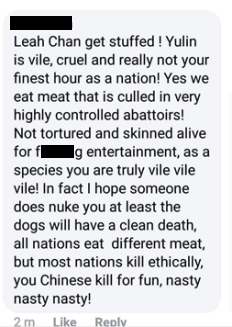
Comment taken from a vegan activist online.
This comment, taken from a vegan activist concerned about the exploitation of dogs in the Lychee and Dog Meat Festival, echoes a dehumanizing narrative about Chinese people. This dehumanization provides them enough justification to call for acts of violence against Chinese people. What is striking about this is that such an idea is ostensive of the very same oppression that vegan activists seek to dismantle. Either that or people have been listening to far too much Morrissey. The very idea that violence towards Chinese people is justified because we are a species separate from humans, or as Morrissey put it - a subspecies - is at the heart of justifications of the consumption of animals. Contradictory, I know.
Being Chinese during the pandemic
Concerns about what Chinese people eat became ever more prominent with the outbreak of Coronavirus, leading to many portrayals of Chinese people as barbaric, uncivilized, and diseased. It doesn’t help that leaders such as Trump have referred to the virus as the ‘Chinese virus’, and his friend, Prime Minister Boris Johnson has left this unchallenged.
Around the world, Asian communities are being targeted with a rise in physical and verbal attacks towards people who are Chinese or perceived as such.
Imagine walking down the street and having people attack you, spit at you, cover their faces as you go by, laugh, whisper, and jeer.
Some of us don’t have to imagine this. Some of us live it.
You would think at least with having to stay home, you’d be safe there. Unfortunately not.
As people turn to social media to stay connected to loved ones during this trying time, some people turn to social media to share their fears and opinions about the pandemic. I noticed that my news feed was flooded with people blaming China and Chinese people for the pandemic. I was shocked, but not surprised.
What did surprise me was that many members of a community that I had felt very much a part of - the vegan activist community - were contributing to the problem. This is not to say that racism did not exist within this community unrelated to, and before, the pandemic.
As I mentioned, it is not uncommon for me to experience comments such as the one shared earlier. However, the frequency of such incidents and the amount of people participating in these incidents became a lot more prominent.
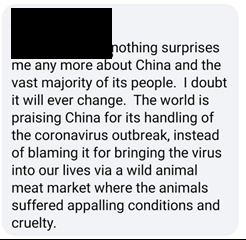
A comment made by a vegan activist online.

A comment made by a vegan activist online.
Black Lives Matter (BLM) and intersectionality
During the protests that responded to the racist murder of George Floyd, a particular activist group drew attention to themselves on issues concerning racism. They had criticized the use of a decapitated pig’s head by BLM protesters during one of the protests, and in doing so provoked anger and alienation amongst many people. Whilst I am not condoning the use of animals to protest, it remains a question as to why the use of horses during this protest was not challenged, and why the specific focus was on BLM protestors, at a very important time for the movement. Meanwhile, the vegan activist group were silent on the racist and systemic oppression that Black people face, until someone on their social media team claimed that systemic oppression doesn’t exist in the West. The ability of vegan activist groups to place animals at the centre of a conversation about racial justice is a privilege that not all can afford. A lack of sensitivity about this led to the alienation of people affected by issues of racial justice from the group, from the vegan community, and from veganism itself – vegans, non-vegans, and vegan activists alike.
Whilst both the post and comment have been removed, with an apology from the vegan activist group’s co-founders, the group remains notorious for its anti-intersectional stance on animal rights activism, with much outrage over issues with transphobia, racism, and sexism.
Personally, I believe that the path to true liberation is to bridge the divide between the human and animal, recognizing that humans are animals as well. Therefore, the dismantling of speciesism involves the liberation of both human animals and non-human animals; an intersectional fight that recognizes the messy entanglements of oppression.
It is worth considering whether an anti-intersectional stance is bringing about liberation for animals more successfully than an intersectional stance. People who support an anti-intersectional stance often argue that intersectionality damages activist movements through the dilution of the cause.

A question posed online by a vegan activist.
Yet, if we are not aiming for total liberation and then are we really dismantling speciesism, or are we perpetuating it? If we are not being intersectional then how are we being inclusive to the diverse range of people in the vegan community – or those who could potentially be part of the vegan community? Anyone looking to maintain a good activist praxis should be reflective of their approach towards activism.
Experiencing racism in my local vegan activist group
I’m not going to lie, when I first became vegan, I did what a lot of people do and jumped straight into activism without asking any of these questions. A local vegan activist group that I joined has a worldwide presence with a praxis that is regulated by the founders of its network. As a result of this hierarchical structure, the anti-intersectional approach is implemented by the local organisers. This has been a problem in my own experiences of participating in activism, at a time when racism towards Asian communities has increased.
I have seen a number of vegan activists from my local vegan activist group posting racist and xenophobic anti-Chinese content online. These activists have often shared misleading information suggesting that China and Chinese people are to blame for the pandemic. They have suggested that Chinese people are ‘at it again’ in creating ‘round two’ of lockdown because of their ‘barbaric’ eating practices. Other activists have gone further in claiming that humans are the virus and that coronavirus is Earth’s karmic retribution. This is a dangerously eco-fascist narrative rooted in white supremacy especially as the people who are affected the worst by the pandemic are disproportionately BAME communities. None of this content is unique to vegan activists and many non-vegans share such views, but coming from my local community who I had previously felt welcomed into for the most part, it was heart-breaking to see.
Of course, when I have been able to do the emotional labour, I have challenged activists whose posts have been problematic. I have then received messages such as this:
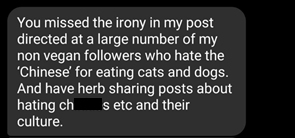
A message from a vegan activist to myself.
For someone who is defending their post as what they believe to be ironic and oppositional to racism, this person sure has no problem using the c* word casually in conversation, or perpetuating monolithic portrayals of Chinese people eating animals. Furthermore, I have no idea why the word Chinese is in quotation marks. There’s a lot to unpack here.
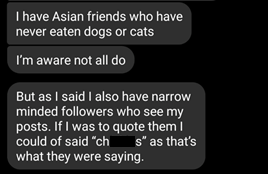
Another message from a vegan activist to myself.
Stating that one has Asian friends does not provide a pass to proliferate racism online – and whether or not ‘Asian friends’ eat dogs or cats, this should not be held as a representation of a whole race. It is uncomfortable that this person continues to use the c* word, although now in quotation marks, recognising that it is problematic to use this racist slur. This person felt the need to point out that they didn’t use the c* word in a public post – there is a sense of seeking praise for not using this word publicly despite saying it privately.
Whilst some of the activists have removed the posts, others have removed me from social media, or I have had to remove them. However, I have approached the organisers of my local vegan activist group with the hope that the racism I was experiencing and witnessing would be addressed. The first time that I approached the organizers was back in April. I was told that:
“While we can’t from an organisational standpoint comment on anyone’s activity outside of our group page or our events and workshops, I can promise you any instances of racism at any of these will be tackled immediately by myself or one of the other organisers.”
In June, after another confrontation about racism, I received a message from one of the organisers letting me know that they stand with me on issues surrounding racism, and they seemed genuinely interested in having an open conversation about this. They proceeded to ask me ‘what is the internal racism, specifically?’. At the time, I appreciated that this organiser was trying to understand the racism that I have experienced so that they could attempt to make changes, but it was emotionally exhausting to be asked this. Having to retell stories of racism, and also having to put yourself in a more vulnerable position by identifying individuals is anxiety inducing, and whilst I want nothing more than for the racism to end, should it really be the case that we have to do this so that change can occur?
The local vegan activist group, and the network that it belongs to, may be anti-intersectional, but they claim that any discrimination or harassment will not be tolerated, and so it really should be the case that there are measures put into place to support this. How hard is it to do the bare minimum and address racism by writing a post that discourages activists from proliferating such views online? How hard is it to set up workshops that let activists know that discrimination is unacceptable? How about a system that supports individuals who want to report such issues without having to feel anxious that they will suffer consequences for speaking out?
At this point, I was upset that no action seemed to be taken, and I made a public statement that I could no longer stand with the local vegan activist group. I then received a message from a fellow activist who also complained about the racism in the group, and they showed me a conversation with an organiser, in which the organiser had said:
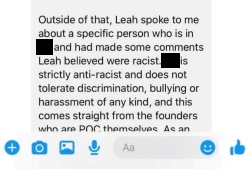
A message from a local organiser to another vegan activist.
Why was I being asked to describe the racism I experienced if it was already known? I also had not named any names. How can this group be ‘anti-racist’ and not tolerate discrimination when they refused to recognise that racism perpetuated by activist members online was just as valid a discrimination to address as racism that occurs at one of their events? I was also shocked to see that my experiences were being diminished to beliefs.
Recently, I noticed that I’d been removed from the online group. Even though I knew I didn’t want to participate, there was a troubling thought in my mind: was I removed for publicly speaking about the racism in this group? I had noticed that other members who decided to not participate any further had not been removed and so it certainly felt this way. I messaged the organisers and they have told me that this is not the reason at all and it is simply due to me not wanting to volunteer anymore. I asked why what has happened has not opened up conversations about racism, and they told me that a lot has changed and that the people involved in an earlier incident no longer work for them.
This is of course some good progress.
They reiterated that there was nothing that could be done without any more information about the specifics of racism within the vegan activist group being shared. After seeing the message to a fellow activist, I was even more anxious about sharing any sort of specifics.
A call to action
This is my response to everything that has happened, to share as much of my experience as I’m willing to, and a critique of what has happened with a call for action.
So how can we improve our activism? I truly believe that an anti-oppression, total-liberation approach is the best; and this must be intersectional. Whether you’re fighting for animal rights, protesting against racism, or smashing patriarchy, spaces to protest can’t be inclusive unless they are intersectional. If they’re not inclusive we then alienate potential allies and existing members of our communities, in addition to perpetuating the very oppression we seek to dismantle. We need to be reflective of our practice as activists and show up for those we stand with.
My intention in writing this was not to be divisive but to share my experiences of racism and activism, so as to critique mainstream activism practices and in doing so open up a conversation about ways to improve our activism. We need to form solidarity with one another against oppression in the fight for total liberation within and beyond the animal rights movement.
By Leah Chan
An extended version of this article was first published on Leah’s blog here: https://cheerychan.com/2020/10/15/a-call-for-action-addressing-racism-towards-asians-in-the-vegan-activist-movement/.
The views expressed by our bloggers are not necessarily the views of The Vegan Society.

